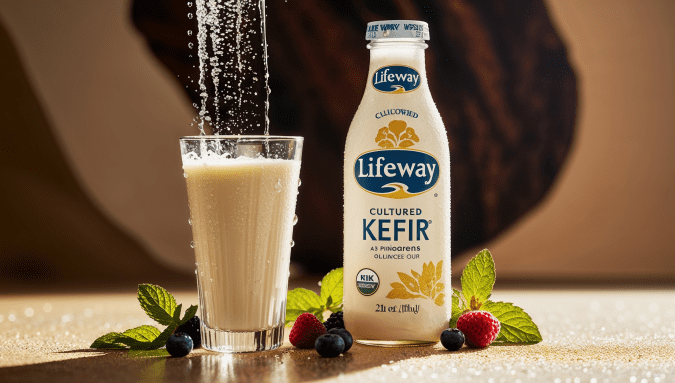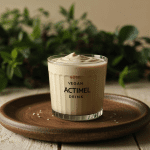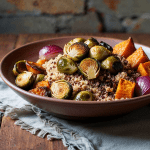This recipe will guide you through making a delicious, dairy-free kefir inspired by Lifeway, using plant-based ingredients. You can use soy milk, almond milk, or cashew milk as your base, and it will be packed with probiotics!
Ingredients
- 4 cups unsweetened soy milk (or almond milk or cashew milk)
- 1/2 cup unsweetened coconut yogurt (with live cultures) or 1-2 vegan probiotic capsules
- 1-2 tablespoons maple syrup or agave syrup (optional, for sweetness)
- Flavorings (optional):
- For Chocolate Flavor: 2 tablespoons unsweetened cocoa powder
- For Fruity Flavor: 1 cup fresh or frozen fruits (like strawberries, blueberries, or mango)
Instructions
Prepare the Base:
- In a blender, combine the unsweetened plant-based milk and coconut yogurt (or the contents of the probiotic capsules). Blend until smooth.
Add Sweetener and Flavorings:
- If you’re making a chocolate-flavored drink, add the cocoa powder and maple syrup to the blender. For fruity flavors, add your choice of fresh or frozen fruits. If using maple syrup for sweetness, add it as well.
- Blend again until all ingredients are well combined and smooth.
Fermentation:
- Pour the mixture into a clean glass jar or container. Cover it with a cheesecloth or a clean kitchen towel secured with a rubber band to allow airflow while preventing contaminants.
- Place the jar in a warm, dark place (ideally between 68°F and 85°F or 20°C to 29°C) for about 24 to 48 hours. The longer it ferments, the tangier it will become.
Taste Testing:
- After 24 hours, taste your kefir. If it has reached your desired level of tanginess, it’s ready! If not, let it ferment for additional time.
Strain and Store:
- Once fermented to your liking, strain the liquid through a fine mesh strainer into bottles or jars to remove any solids.
- If desired, add flavorings like fresh fruits or herbs at this stage.
- Seal the bottles tightly and refrigerate. Consume within one week for optimal freshness.
Enjoy:
- Shake well before serving and enjoy your homemade vegetarian kefir as a refreshing beverage!
Tips
- Flavor Variations: Experiment with different fruits or spices like cinnamon for unique flavors.
- Monitoring Fermentation: Keep an eye on your drink during fermentation; warmer temperatures will speed up fermentation.
- SCOBY Option: If you have a SCOBY from making kombucha, you can use it instead of yogurt for fermentation!
Creative Ways to Flavor Vegan Kefir
- Fruity Blends: Add fresh or frozen fruits like strawberries, blueberries, mangoes, or bananas for natural sweetness and flavor.
- Cocoa Delight: Mix in unsweetened cocoa powder or melted dark chocolate for a rich chocolate-flavored kefir.
- Spiced Variations: Incorporate spices like cinnamon, nutmeg, or ginger for a warming touch.
- Herbal Infusions: Add fresh herbs like mint or basil for a refreshing twist.
- Vanilla Bean: Use vanilla extract or the seeds from a vanilla bean to enhance the flavor profile.
- Nut Butters: Blend in almond butter or peanut butter for a creamy texture and nutty flavor.
- Citrus Zest: Add lemon, lime, or orange zest for a bright and zesty flavor.
Can I Make Kefir with Oat Milk?
Yes, you can make kefir with oat milk! Oat milk works well as a base for vegan kefir, providing a creamy texture and slightly sweet flavor. When using oat milk, it may be beneficial to combine it with other plant-based milks (like almond or soy) to ensure sufficient nutrients for the fermentation process.
How Does the Taste of Kefir Made with Different Plant-Based Milks Compare?
The taste of kefir can vary significantly depending on the type of plant-based milk used:
- Soy Milk: Produces a creamy and slightly nutty flavor; it tends to ferment well due to its protein content.
- Almond Milk: Offers a light, nutty flavor; may be less creamy than soy but still provides a pleasant taste.
- Cashew Milk: Results in a rich and creamy texture with a mild flavor; often considered one of the best options for kefir.
- Oat Milk: Has a naturally sweet and smooth taste; it can create a slightly thicker kefir compared to almond milk.
What Are the Nutritional Differences Between Kefir Made with Soy Milk and Cashew Milk?
- Soy Milk:
- Higher in protein (about 7-9 grams per cup).
- Contains more isoflavones, which have potential health benefits.
- Often fortified with calcium and vitamin D.
- Cashew Milk:
- Lower in protein (about 1 gram per cup).
- Higher in healthy fats, particularly monounsaturated fats.
- Generally lower in calories than soy milk and may contain fewer additives if homemade.
Can I Use a Different Type of Kefir Starter for Plant-Based Milks?
Yes, you can use different types of kefir starters for plant-based milks. While traditional milk kefir grains are commonly used, you can also opt for:
- Powdered Kefir Starter Cultures: These are specifically designed for use with non-dairy milks and can be found at health food stores or online.
- Water Kefir Grains: Although they are typically used for water kefir, they can sometimes be adapted for use with plant-based milks as well.
Using the appropriate starter culture helps ensure successful fermentation and optimal flavor in your vegan kefir!
This homemade vegetarian Lifeway-inspired kefir is nutritious and customizable to suit your taste preferences! Enjoy!












